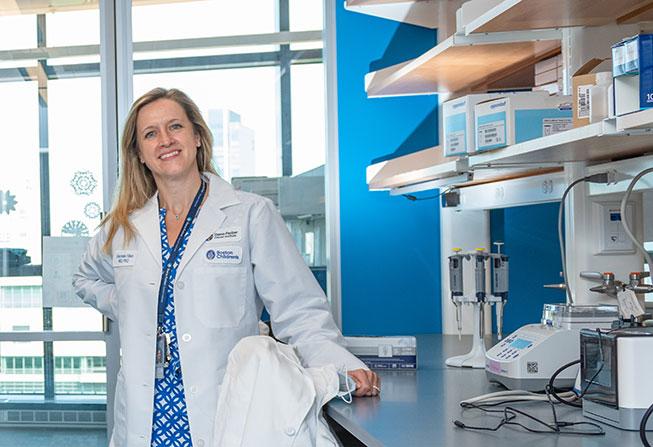Research in Pediatric Neuro-Oncology

Pediatric Brain Tumor Research
Brain cancer is one of the most difficult cancers to treat, but researchers in the Department of Pediatric Oncology are working towards dramatically increasing survival rates.
There are many different pediatric brain tumor types and classifications based on a tumor's cell structure, composition, rate of growth, location, and other characteristics. These tumors may have the same microscopic appearance as adult tumors, but the mutations that cause their growth are completely different.
The goal of the pediatric brain tumor research team is to better understand the cellular and molecular biology of these childhood brain tumors to unearth new therapeutic strategies.
Gliomas and Ependymomas
One research focus area is gliomas — the most common pediatric brain tumor — and ependymomas. We are home to the first coordinated effort focusing on low-grade gliomas. The Pediatric Low-Grade Astrocytoma Program (PLGA) has a five-year objective to identify new molecular targets and translate them into clinical trials.
Our research also focuses on high-grade gliomas, such as DIPG, glioblastoma, and gliomatosis cerebri, where we are using genomic information to help develop new treatment strategies. In addition, we are leveraging the newest single-cell genomic sequencing technologies in gliomas and ependymomas to analyze exactly how these tumors develop in the first place, and how they interact with the normal cells around them. This approach has a vastly more precise view of each tumor's complex landscape than the historical sequencing approach used to interpret a tumor's genomic profile.
Embryonal Tumors
For embryonal tumors, such as medulloblastoma and embryonal tumors with multilayered rosettes (ETMRs), our research team is finding new molecular targets within the tumor cells (on both the genetic and epigenetic level), while also considering the unique microenvironment of brain tumors — the interactions of tumor cells with normal neurons, glia, and immune cells. Leading-edge technology, such as spatially-resolved single cell transcriptomics and high-throughput drug screens and CRISPR screens are applied.
Participating Labs
Other Labs Involved in Pediatric Brain Tumor Research
- Segal Lab (Dana-Farber)
- Stiles Lab (Dana-Farber)
- Agar Lab (Brigham and Women's Hospital)
- Ligon Lab (Dana-Farber)
- Beroukhim Lab (Dana-Farber)
- Pomeroy Lab (Boston Children's Hospital)